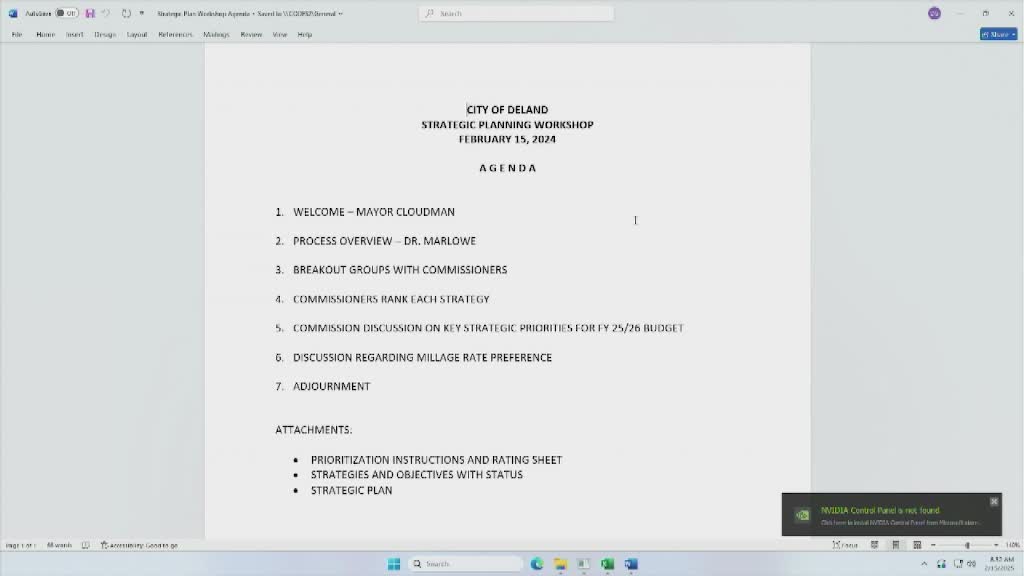DeLand commissioners focus on employee retention, capital needs as budget outlook tight
Get AI-powered insights, summaries, and transcripts
Subscribe
Summary
City of DeLand commissioners used a strategic-plan budget workshop to prioritize employee retention, public safety and capital projects after staff presented early estimates showing slower taxable value growth, falling state revenue and a projected budget gap.
At a strategic-plan budget workshop, the City of DeLand heard staff projections showing slower taxable-value growth and falling state revenue and used the session to set priorities for the fiscal-year budgeting process.
Staff member Dan summarized the preliminary fiscal picture: "As far as state revenues go, we're also seeing a kind of leveling off as well as a decrease, state sales tax," and said an early estimate from the property appraiser showed about a 7.5% taxable-value increase and roughly $58,000,000 of new construction — numbers staff called preliminary and subject to revision.
The nut of the discussion was how to close an early projected deficit while funding personnel, operating-cost increases and a large capital request list. Dan presented estimated costs including a 50-cent minimum-wage increase to $17.25 (estimated at $572,000) and a typical 3% merit pool (about $778,000); a 6% insurance estimate (roughly $171,000); and the need to budget the second half of three firefighter hires included partially this year. He said the packet showed nearly $10,000,000 in capital requests and that the city was using reserves and American Rescue Plan Act (ARPA) funds to support some operating costs, including roughly $600,000 a year toward a homeless shelter.
Commissioners debated trade-offs between keeping the current millage, trimming capital contributions or using reserves and ARPA funds. Commissioner Powell argued against relying solely on cuts: "There's resentment for paying taxes. And even if the taxes were half of what they are, would that reduce the resentment by half? And I'm gonna propose it won't, and it doesn't," and urged attention to recruitment and retention measures that affect service delivery. Several commissioners said employee recruitment and retention — especially for entry-level positions and public safety — emerged as a common priority from small-group discussions held during the workshop.
Commissioner Reed and others suggested staggering hires rather than beginning all new positions immediately; Reed proposed budgeting for partial or staggered hiring and reducing the initial dollar amount for newly requested positions. Multiple commissioners voiced support for maintaining a capital millage contribution (described in the packet as a 0.4 mill contribution to a capital fund) so the city could continue funding infrastructure demands.
Chris Graham summarized the commissioners' prioritization survey results: retention and staffing needs ranked high, and public safety and quality-of-life features also received strong support. Commissioners asked staff to use the workshop input as guidance while building the proposed budget and to return a proposed budget in July and a final budget for adoption in September.
No formal votes or ordinance actions were taken at the workshop; commissioners framed this as an information and prioritization exercise to guide staff work. Staff repeatedly cautioned the financial numbers were early estimates from the property appraiser and state revenue forecasts and could change.
Next steps: staff will refine revenue and expenditure projections, model scenarios for staffing and capital funding (including options that use ARPA or reserves), and return with a formal proposed budget in July and items for formal action in subsequent public meetings.
